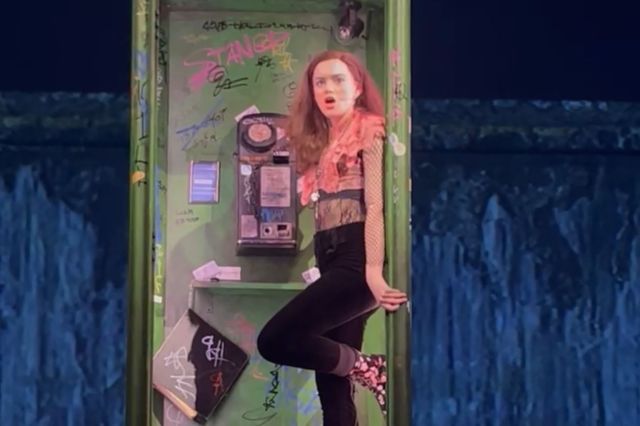Mysteries (tour)
Conclusive proof that the story of God circumnavigates his creation and blows away cultural, ethnic and geographical boundaries is to be found in this high-energy theatrical celebration.
The Mysteries follows the well-known pattern of the Bible
as Christians perceive it – inspired as it is by the Chester Mystery Plays
performed in that most English of cities since medieval times. Yet such is the passion, the exuberance, the joy exuded by this quite
remarkable South African company that it could just as easily be applied to
the Koran, the teachings of Bhuddism or the Torah and Talmud of Judaism.
The Mysteries‘ seamless mixture of the four main languages of the Cape serve to
reiterate the Everyman view of religion – the way to steer the path of good
over evil, touching lives positively along the way. And this is a religious celebration in its purest form – the type of worship
that could have been celebrated 5000, 2000, 200 years ago.
On the simplest of sets, scaffolding surrounding a raked wooden stage, the
company use what nature has given them – a quite remarkable set of voices,
spine-tingling music, those emotive languages and, in a modern concession
to durability, oil drums, steel pipes and sheets of metal in place of the
trees and plants from which the first instruments would have been made. But of amplification, there is none. Instead, the richness of the voices rings
around the walls and, for all I know, carries halfway to Heaven.
There are some wonderful surprises, too: the birth of Adam from a sandy grave
beneath the stage, the fiery incarnation of hell, the creation of the Ark
from nothing more than a piece of fencing trellis. But it’s the feeling of sheer spontaneity of performance that sweeps you up and carries you right along with it.
The musical numbers are as culturally diverse as the language, from the
Latin of “Gaudete” through “You Are My Sunshine” to the irresistible
heartbeat rhythms of the African plains. They perfectly complement the action, and the heartrending plainsong which accompanies the crucifixion will remain with me for a very long time.
The cast is led from the front by the charismatic Vumile Normanyama as
God/Jesus and Andries Mbali as his nemesis Lucifer. Special mention, too, for Sibusiso Ziqubu as Noah and Ruby Mthethwa as Mary Magdalene, but really this is the definitive ensemble show stunningly orchestrated by creator-director Mark Dornford-May and musical director
and fellow creator Charles Hazelwood.
– John Lawson (reviewed at Norwich’s Theatre Royal)
Note: The following review dates from February 2002 and this production’s previous run at the West End’s Queen’s Theatre.
Umoja may have been forced to suspend its run at the Shaftesbury, but
South African theatre is still widely represented in London, with the
one-woman confessional The Syringa Tree at the National and the
political drama The Island continuing at the Old Vic. Now, joining
them after a sell-out run at Wilton’s Music Hall last summer, comes {The
Mysteries::L1251211124}, a massive undertaking featuring a cast of some 40 talented
and totally dedicated people.
Told in multiple and distinctive African languages and rhythms, it’s good
that we know these stories already, since it’ would not otherwise
always be easy to follow. If Cole Porter were around, he might be advising
us, “Brush up your bible, start quoting it now”. The vibrancy and uniqueness
of this enterprise, however, is to see these familiar tales – from Adam and
Eve to the Crucifixion – so beautifully distilled through the eyes of a
totally different culture.
A raked wooden stage is mostly bare but for a few scaffolding poles, with a
ramp projecting into the stalls. In so doing with such naked simplicity, it
honours the origins of the Mystery plays themselves, which were originally a
kind of medieval street theatre. There’s no denying, either, the integrity
or gusto with which the company commit themselves to it.
There’s also a theatrical naivety to The Mysteries that I don’t want to patronise because it is so clearly born of real sincerity. However, it has to be
admitted that the show – conceived and created by director Mark
Dornford-May and musical director Charles Hazlewood – looks a little lost
on a West End stage. For me, that may partly be because it has to compete
with the memory of Bill Bryden‘s three-part Yorkshire version of The
Mysteries that was one of the landmarks of the National’s time on the
South Bank.
But in the exhilarating moments when this Mysteries gives us the authentically
soaring musical heartbeat of Africa, there’s also no resisting it, either.
Thank goodness, too, that it’s not playing at the Shaftesbury, or it would
be upsetting the neighbours again.
As it is, I’m told that there is some
sound seepage problems to the Gielgud next door, where Humble Boy is
playing. When Maggie Smith was doing Lettice and Lovage on Broadway
at a theatre that backed onto another housing a loud gospel
musical, she reportedly asked her stage manager to do something
about it. He suggested hanging some blacks. Dame Maggie is famously said to
have replied, “Don’t you think that would be going a little too far?” I hope
Felicity Kendal doesn’t find herself faced with the same dilemma.












